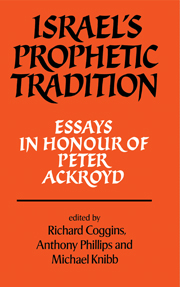Book contents
- Frontmatter
- Contents
- Preface
- Biographical note
- Abbreviations
- Note
- Prophecy in the ancient Near East
- The origins of prophecy in Israel
- Three classical prophets: Amos, Hosea and Micah
- The Isaiah tradition
- An alternative prophetic tradition?
- Visionary experience in Jeremiah
- The Ezekiel tradition: prophecy in a time of crisis
- The prophets of the restoration
- Prophecy and the emergence of the Jewish apocalypses
- Prophecy and wisdom
- Prophecy and the cult
- Prophecy and law
- A change of emphasis in the study of the prophets
- Martin Buber and the interpretation of the prophets
- Index of Biblical References
Martin Buber and the interpretation of the prophets
Published online by Cambridge University Press: 09 January 2010
- Frontmatter
- Contents
- Preface
- Biographical note
- Abbreviations
- Note
- Prophecy in the ancient Near East
- The origins of prophecy in Israel
- Three classical prophets: Amos, Hosea and Micah
- The Isaiah tradition
- An alternative prophetic tradition?
- Visionary experience in Jeremiah
- The Ezekiel tradition: prophecy in a time of crisis
- The prophets of the restoration
- Prophecy and the emergence of the Jewish apocalypses
- Prophecy and wisdom
- Prophecy and the cult
- Prophecy and law
- A change of emphasis in the study of the prophets
- Martin Buber and the interpretation of the prophets
- Index of Biblical References
Summary
When Buber died in 1965 his life and work were hailed in the press of the Western world as worthy of the description ‘prophetic’. The reluctance of many of his Jewish contemporaries to join the chorus of praise gave an authentic note to such a description, for the office of prophet has always been conceded to be unpopular. For political reasons Buber was, and still is, often ‘without honour’ in Israel: his federalist ideals, comprising Jews and Arabs, could hardly commend themselves to an army under siege. But a far more deep-rooted and potentially lasting opposition came, and continues to come, from the traditionalists. This is hardly surprising, since Buber never claimed to be orthodox in matters of ritual observances. Moreover, his links with Christian theologians and his dialogue with the great men of his epoch aroused suspicions, which were not allayed by his clear allegiance to Judaism as the prophetic faith, the way of' emunah as distinct from the pistis of Greek conceptualism, with which he identified Pauline Christianity. Only a few years after his death Gershom Scholem, erstwhile disciple and active correspondent of Buber, drew a balance-sheet in fifty pages of a closely-argued indictment (Scholem, 1978, pp. 126–71). Scholem traverses the ground of Buber's many contradictions to accuse him of ‘the infinite slipperiness of his formulations’ and ends his evaluation with the sad verse: ‘Blessed are those who sow but do not reap.’
- Type
- Chapter
- Information
- Israel's Prophetic TraditionEssays in Honour of Peter R. Ackroyd, pp. 250 - 262Publisher: Cambridge University PressPrint publication year: 1982



